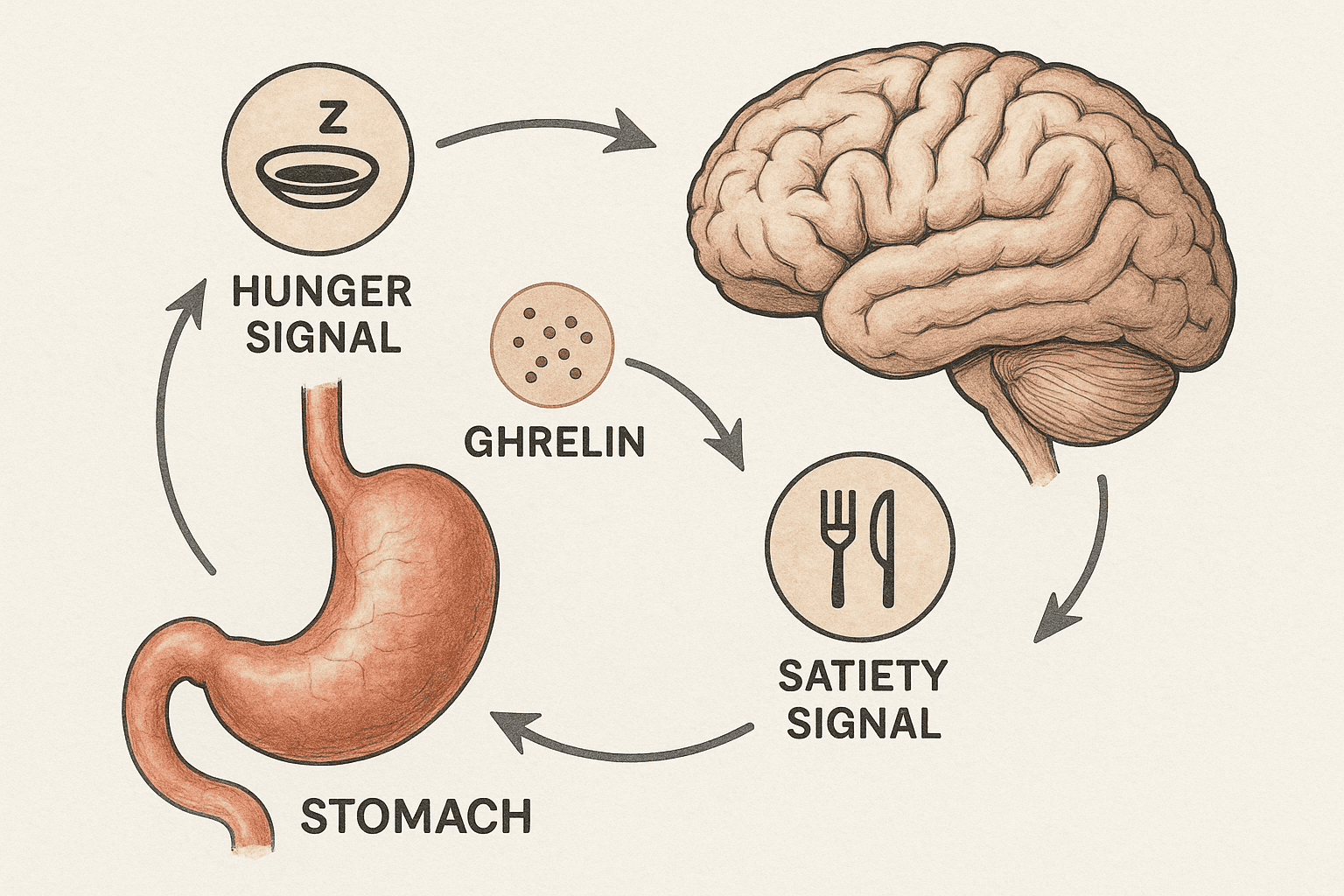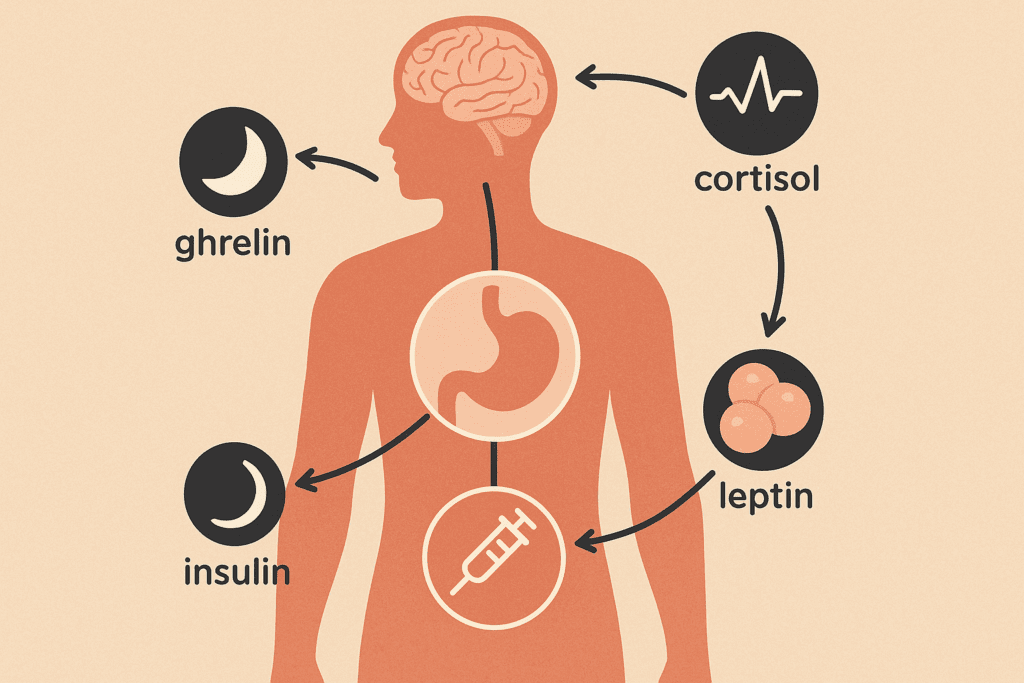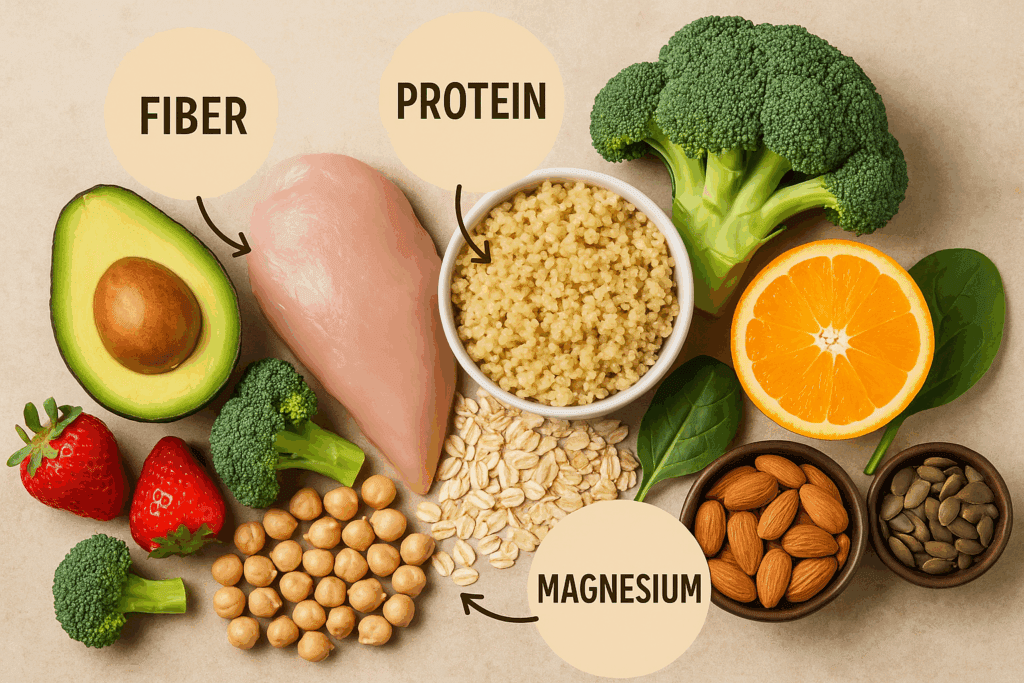Introduction: When Fullness Feels Elusive
For many people, eating until full should provide a sense of satiety and satisfaction. Yet, there is a growing number of individuals who find themselves constantly asking, “Why do I never feel full?” Despite consuming what would be considered a normal or even large meal, the sensation of hunger can linger, sometimes immediately or just a short while after eating. This disconnection between food intake and feeling satiated is not only frustrating but can also signal deeper issues related to physiology, psychology, and dietary patterns.
You may also like: How to Stop Emotional Eating and Regain Control: Mindful Nutrition Strategies That Support a Healthier Lifestyle
This article explores the underlying mechanisms that explain why someone might experience the “eating til full but still feel hungry” symptom. It also examines the common question, “Why do I feel hungry at night even after eating?” and how modern dietary habits, stress, hormones, and even lifestyle choices contribute to this phenomenon. By the end of this piece, readers will gain a deeper understanding of how hunger works, what can disrupt natural satiety cues, and how to regain control over eating patterns through mindful nutrition and evidence-based strategies.

Understanding Hunger: More Than Just an Empty Stomach
To understand why someone might never feel full, it’s essential to unpack what hunger really is. Hunger is a complex biological and psychological signal. At its core, it is the body’s way of telling us that it requires energy. However, hunger is not merely a stomach-driven cue. It involves the coordination of hormones, neurotransmitters, and even the brain’s reward system.
The primary hormones involved in hunger and satiety include ghrelin, often referred to as the “hunger hormone,” and leptin, known as the “satiety hormone.” Ghrelin levels rise before meals and fall after eating, while leptin signals to the brain when the body has enough stored energy. In individuals who frequently feel hungry even after eating, this delicate hormonal balance may be disrupted.
Psychological hunger, on the other hand, is more subtle and complex. It can be triggered by emotions, stress, boredom, or social situations. This type of hunger is often less about physiological need and more about habit or comfort. Understanding the distinction between physical and psychological hunger is key for addressing the ongoing struggle of never feeling full.

The Science Behind the “Eating Til Full But Still Hungry” Symptom
The paradox of eating until full yet still feeling hungry is more common than many realize. One explanation lies in the speed of eating. When individuals eat quickly, their body doesn’t have sufficient time to register fullness. Satiety signals typically take about 20 minutes to reach the brain. Thus, those who rush through meals may consume more food than necessary and still feel unsatisfied.
Another contributor to this symptom is the composition of the meal itself. Meals high in refined carbohydrates and low in fiber or protein can cause rapid spikes and subsequent drops in blood sugar. This fluctuation often leads to increased hunger shortly after eating. In contrast, meals that include healthy fats, lean proteins, and complex carbohydrates tend to promote longer-lasting satiety.
A third factor is emotional and habitual eating. Individuals who have learned to eat in response to stress, sadness, or even as a reward may continue feeling hungry even after eating because the emotional craving remains unmet. This disconnect between physical nourishment and emotional fulfillment is a common root of the “eating til full but still feel hungry” symptom.

How Hormones Influence Satiety and Cravings
Hormonal imbalances are a significant and often overlooked cause of persistent hunger. Ghrelin and leptin are critical in regulating appetite, but other hormones also play a role. For instance, insulin not only helps regulate blood sugar but also affects hunger. Insulin resistance, common in people with prediabetes or type 2 diabetes, can lead to feelings of constant hunger.
Cortisol, the body’s primary stress hormone, is another major player. Elevated cortisol levels, often the result of chronic stress, can increase appetite and cravings for high-fat, high-sugar foods. This can contribute to overeating and the persistent feeling of being unsatisfied, regardless of caloric intake.
Thyroid hormones also deserve mention. An underactive thyroid (hypothyroidism) can slow down metabolism, lead to fatigue, and paradoxically make people feel hungrier as their body struggles to produce energy. When hormone regulation is off, it becomes harder for the brain to interpret true hunger versus other physiological imbalances.
Why Do I Feel Hungry at Night Even After Eating?
Feeling hungry at night, even after a full dinner, is a common experience for many adults. This nighttime hunger can often be traced back to dietary patterns earlier in the day. Skipping meals or eating too little during the day can trigger the body to seek compensation later, often in the form of late-night snacking.
Additionally, the quality of the evening meal plays a role. Meals high in simple carbohydrates may lead to a quick rise and fall in blood glucose, triggering hunger signals soon after. Nighttime hunger can also be behavioral—many people associate late-night TV or winding down with snacks, creating a habitual cycle that’s difficult to break.
Sleep quality also influences this phenomenon. Poor sleep disrupts the regulation of ghrelin and leptin, often resulting in increased appetite and cravings the next day. It can also skew hunger cues at night, leaving individuals wondering, “Why do I feel hungry at night even after eating?” Despite having sufficient caloric intake, sleep-deprived brains often send mixed signals about hunger and fullness.

Mindful Eating as a Strategy to Reconnect with Fullness
One powerful approach to overcoming the feeling of never being full is mindful eating. This practice involves being fully present during meals, paying close attention to the body’s cues, and slowing down the pace of eating. Mindful eating encourages individuals to savor their food, chew thoroughly, and stop eating once satisfaction—not fullness or discomfort—is reached.
Research shows that mindful eating can improve satiety and reduce overeating. It allows individuals to distinguish between true hunger and emotional or environmental triggers. When practiced consistently, mindful eating helps reset the body’s natural hunger and satiety cues.
It’s also helpful to avoid distractions like screens during meals. Watching television or scrolling through a phone while eating often leads to unconscious consumption, resulting in the “eating til full but still hungry” symptom. Mindfulness fosters a deeper connection to food and can enhance satisfaction, even with smaller portions.
Nutritional Deficiencies That Disrupt Satiety
Certain nutritional deficiencies can impair the body’s ability to feel full. For example, inadequate intake of dietary fiber can lead to rapid digestion and a shorter window of satiety. Fiber slows the digestive process and promotes the release of satiety hormones.
Low protein intake is another concern. Protein is essential for maintaining lean muscle mass and has a strong satiating effect. Meals that lack protein may leave individuals feeling hungry sooner, even if they’ve consumed sufficient calories.
Micronutrients also play a role. Deficiencies in magnesium, zinc, or B vitamins can impair energy metabolism and appetite regulation. When the body lacks essential nutrients, it may send hunger signals as a way of seeking what it needs, further contributing to the question of “why do I never feel full?”
The Role of the Brain in Hunger and Reward
The brain’s reward system is intricately tied to hunger and eating behaviors. Dopamine, the neurotransmitter associated with pleasure and reward, is released in response to highly palatable foods—those high in sugar, fat, and salt. This dopamine release can drive individuals to eat more, even when they’re not physically hungry.
This phenomenon is particularly relevant in cases of food addiction or compulsive eating. In these situations, the body’s physical hunger may be satisfied, but the brain continues to seek the pleasurable experience of eating. Over time, this can dull the body’s natural satiety signals and reinforce the cycle of overeating.
Modern food environments, filled with hyper-palatable processed foods, exacerbate this issue. The accessibility and convenience of these foods make it easy to override the body’s natural cues. Addressing these patterns requires a combination of nutritional rehabilitation, behavioral therapy, and in some cases, professional medical support.

Lifestyle Factors That Undermine Satiety
In addition to food and hormonal influences, lifestyle factors such as stress, lack of sleep, and sedentary behavior can significantly affect how full someone feels after eating. Chronic stress can dysregulate cortisol levels, which in turn influence hunger and cravings. People under stress are more likely to seek comfort foods and may eat impulsively rather than mindfully.
Poor sleep hygiene not only impacts hormonal balance but also alters appetite-regulating centers in the brain. Studies have shown that individuals who sleep fewer than six hours a night tend to consume more calories and report more frequent hunger throughout the day. The circadian rhythm also plays a role—eating late at night when the body is less metabolically active can disrupt digestion and fullness cues.
Physical inactivity can blunt the body’s sensitivity to hunger and satiety hormones. Regular exercise, on the other hand, has been shown to improve leptin sensitivity and support better appetite control. A holistic approach that includes stress management, quality sleep, and physical activity is essential to address the root causes of persistent hunger.
Medical Conditions Linked to Constant Hunger
While lifestyle and psychological factors are often the culprits behind ongoing hunger, certain medical conditions can also be at play. Diabetes, especially when poorly managed, can cause frequent hunger due to blood sugar fluctuations. In type 2 diabetes, insulin resistance prevents glucose from entering cells efficiently, prompting the body to seek more fuel in the form of food.
Hyperthyroidism, or an overactive thyroid, can increase metabolic rate and energy demands, leading to excessive hunger. Similarly, certain gastrointestinal conditions that impair nutrient absorption, such as celiac disease or Crohn’s disease, can result in ongoing hunger as the body tries to compensate for what it’s missing.
Polycystic ovary syndrome (PCOS), a hormonal disorder common in women of reproductive age, is also linked with insulin resistance and increased appetite. If someone experiences the “eating til full but still hungry” symptom regularly and has accompanying health concerns, seeking medical evaluation is a crucial step.

How to Reset Your Hunger Cues and Support Fullness
Resetting the body’s natural hunger cues involves a multipronged approach that addresses both the mind and body. The first step is to create structure around meals—eating at consistent times and including balanced macronutrients can stabilize blood sugar and reduce erratic hunger.
Hydration also matters. Often, mild dehydration can masquerade as hunger. Ensuring adequate fluid intake throughout the day can reduce unnecessary snacking and support optimal digestion. Starting meals with a glass of water can also promote feelings of fullness.
Building meals with fiber-rich vegetables, whole grains, lean proteins, and healthy fats can help extend satiety. These foods digest more slowly and support the release of hormones that signal fullness to the brain. Practicing gratitude before eating and eating without distractions can also recondition the brain to respond to true hunger and satiety signals.
Frequently Asked Questions: Why Do I Never Feel Full?
1. Can gut microbiome imbalances contribute to feeling hungry even after eating?
Yes, emerging research has linked the gut microbiome—the trillions of bacteria in your digestive tract—to hunger regulation. An imbalance in gut flora may affect the production of appetite-regulating hormones like ghrelin and peptide YY. When these signals are disrupted, it could explain why some people say, “Why do I never feel full, even after a hearty meal?” Certain harmful bacteria thrive on sugar and may actually manipulate your cravings, creating a feedback loop of hunger. Restoring microbial balance through fiber-rich foods, fermented items, and prebiotics may help reduce the “eating til full but still feel hungry” symptom over time.
2. Could medications be responsible for making me feel constantly hungry?
Yes, several medications can increase appetite or interfere with satiety signals. Drugs such as corticosteroids, some antidepressants, antipsychotics, and even insulin can heighten hunger sensations. If you’re asking, “Why do I never feel full since starting a new medication?” the answer might lie in pharmacological side effects. These medications may alter hormone levels, impact blood sugar, or cause weight gain, all of which can drive persistent hunger. It’s important to speak with your healthcare provider if the “eating til full but still feel hungry” symptom started after a medication change.
3. How do restrictive diets lead to feelings of hunger that don’t go away?
Overly restrictive diets, particularly those low in calories or macronutrients, often lead to metabolic adaptations that trigger increased hunger. When the body perceives starvation, it ramps up ghrelin production and downregulates leptin, creating a stronger drive to eat. That’s one major reason why people frequently ask, “Why do I never feel full while dieting?” Your body may be trying to compensate for a perceived energy deficit, even if you’re eating meals regularly. Moreover, the psychological deprivation that accompanies strict dieting can amplify cravings, often leading to the “eating til full but still feel hungry” symptom after breaking the diet.
4. Is there a psychological reason why I feel hungry late at night even after a proper dinner?
Absolutely. Nighttime hunger often has roots in emotional or behavioral patterns rather than physiological needs. People asking, “Why do I feel hungry at night even after eating?” may be responding to learned habits such as associating TV time with snacks or using food as a stress reliever. Additionally, psychological conditions like anxiety, ADHD, or depression can interfere with hunger regulation and impulse control, making late-night cravings more intense. In these cases, addressing underlying emotional triggers is just as important as nutritional strategies.
5. Can dehydration make you feel like you’re hungry all the time?
Yes, dehydration is a frequently overlooked factor in persistent hunger. The body often sends out signals of thirst that are misinterpreted as hunger, especially when the brain struggles to distinguish between the two. If you find yourself constantly asking, “Why do I never feel full, even when I’ve eaten?” it might be worth tracking your water intake. A good practice is to drink a glass of water and wait 10 to 15 minutes before eating, to see if the hunger dissipates. Chronic low fluid intake can amplify the “eating til full but still feel hungry” symptom by blunting normal satiety cues.
6. Are there cultural or environmental factors that affect how full we feel?
Yes, the way people experience hunger and fullness can be significantly shaped by cultural norms and food environments. In fast-paced societies, eating quickly or while distracted can override natural satiety signals. Social pressures to clean one’s plate or indulge during celebrations may also recondition the brain’s hunger responses. People raised in food-insecure environments may develop a tendency to overeat as a protective measure, contributing to long-term feelings of unsatisfaction. So if you’re wondering, “Why do I feel hungry at night even after eating?” it could be linked to learned behaviors and not just biology.
7. Can hormonal shifts during menopause or other life stages affect feelings of fullness?
Yes, hormonal changes such as those experienced during menopause, adolescence, or pregnancy can deeply impact hunger regulation. Estrogen, in particular, plays a role in modulating satiety, and its decline during menopause may contribute to the “eating til full but still feel hungry” symptom. Similarly, during adolescence, growth spurts and increased energy demands can make hunger feel insatiable. Pregnancy involves hormonal changes that heighten hunger signals to support fetal development. These natural life transitions can answer the common concern, “Why do I never feel full, even with balanced meals?”
8. Why do some people feel full longer than others after eating the same meal?
Individual metabolic differences, such as basal metabolic rate, hormone sensitivity, and digestive efficiency, can all influence how long satiety lasts. Genetic factors may affect how your body responds to ghrelin and leptin, while gut health and nutrient absorption also play key roles. If you’re often asking, “Why do I never feel full when others do?” the answer may lie in your unique biology. Additionally, psychological perception of fullness varies—what feels like a satisfying meal to one person may not mentally register the same way for another. This disparity helps explain why the “eating til full but still feel hungry” symptom isn’t a one-size-fits-all issue.
9. How can stress-management techniques help reduce persistent hunger?
Stress elevates cortisol levels, which can directly stimulate appetite and increase cravings for high-fat, high-sugar foods. Techniques like meditation, journaling, deep breathing, or physical exercise can help lower cortisol and rebalance hunger hormones. People dealing with chronic stress often report, “Why do I feel hungry at night even after eating a large dinner?” This is likely because stress disrupts the normal feedback loop of satiety. Integrating daily stress-relief practices can significantly reduce the frequency and intensity of the “eating til full but still feel hungry” symptom, especially when paired with mindful eating.
10. Is it possible to train my body to feel full on smaller portions?
Yes, over time, you can recalibrate your hunger and fullness cues through intentional habits. Slowing down at meals, chewing thoroughly, and focusing on whole foods can enhance nutrient signaling and help the body feel satisfied with less food. Many people say, “Why do I never feel full unless I overeat?” because their satiety cues have been dulled by years of rushed or distracted eating. Gradually reducing portion sizes while increasing nutrient density can restore a sense of control and satisfaction. Consistency is key in retraining your appetite and reducing the need for excessive intake to feel full.
Conclusion: Reclaiming Control Over Your Hunger and Health
The ongoing struggle with questions like “why do I never feel full” or “why do I feel hungry at night even after eating” reveals just how deeply intertwined our eating habits are with biology, psychology, and lifestyle. Understanding the science behind hunger—especially the “eating til full but still feel hungry” symptom—allows us to address it with empathy and precision rather than frustration or guilt.
True satiety isn’t achieved through calories alone; it is a result of balanced nutrition, hormonal health, mindful habits, and emotional well-being. By exploring the root causes behind these persistent hunger cues and integrating strategies that support both body and mind, individuals can begin to restore their relationship with food. Whether it’s through a shift in dietary composition, improved sleep, or simply slowing down to savor each bite, the journey to feeling truly full is both achievable and transformative.
If you’re consistently struggling with these sensations despite making thoughtful changes, consider seeking guidance from a registered dietitian, endocrinologist, or mental health professional. With the right support, it’s possible to decode your hunger signals, nourish your body effectively, and finally feel satisfied after every meal.
Was this article helpful? Don’t let it stop with you. Share it right now with someone who needs to see it—whether it’s a friend, a colleague, or your whole network. And if staying ahead on this topic matters to you, subscribe to this publication for the most up-to-date information. You’ll get the latest insights delivered straight to you—no searching, no missing out.
Further Reading:
14 Reasons Why You’re Always Hungry

